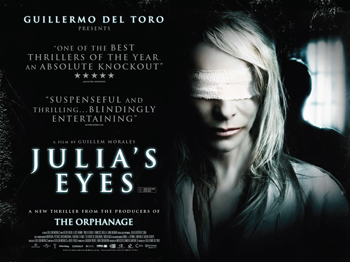Julia’s Eyes ****
 Writer/director director Guillem Morales has a great talent for horror that fantasy-horror maestro and co-producer of this film, Guillermo del Toro has recognised. Morales is certainly welcomed into the del Toro fold, here, as he comes on board to direct del Toro’s The Orphanage leading lady, the mesmerising Belén Rueda, in this richly layered, beautifully-shot, and terrifyingly effective psychological thriller.
Writer/director director Guillem Morales has a great talent for horror that fantasy-horror maestro and co-producer of this film, Guillermo del Toro has recognised. Morales is certainly welcomed into the del Toro fold, here, as he comes on board to direct del Toro’s The Orphanage leading lady, the mesmerising Belén Rueda, in this richly layered, beautifully-shot, and terrifyingly effective psychological thriller.
One of the many films that premiered at 2010’s Toronto International Film Festival, Julia’s Eyes tells the story of a woman, Julia (Rueda), with a degenerative optical illness who believes her dead twin sister – who suffered from the same condition – met an untimely end. Against her worried husband, Isaac’s (Lluís Homar) wishes, she continues to investigate the mysterious circumstances surrounding her sister’s death, having to deal with some ugly truths and her own grief and failing health at the same time.
Morales keeps his framing tight, heavily shadow-laden and claustrophobic to escalate the fear of what’s in the dark and losing your sight. Óscar Faura’s stunning cinematography – with its blue palette for the scarier scenes that looks like a del Toro signature – almost plays with your own vision at times, and serves as a visual double entendre in terms of Julia’s failing eyesight, but also her failing clarity over what really happened to her sister.
Morales keeps a sinister, otherworldly presence flowing for the first part of the film, as though the sister was killed by something supernatural, lurking in the shadows. It’s a powerful concept that increases the tension, and gives you an understanding of the madness that Julia is spiralling into. The end of the film plays out like any other creepy thriller, but still, when the identity of the real killer is revealed, Morales still keeps him ‘decapitated’, until the very end. There’s also a terrifying knife scene, vaguely reminiscent of Luis Buñuel’s Un Chien Andalou, and equally gasp inducing – even if you didn’t know the sequence was filmed for real with no post-production effects in play.
Rueda is always a sheer joy to watch, a pure Hitchcockian heroine in this, an enticing combination of beauty (including eye-popping bosom), determination, strength and fragility. As Julia is our eyes on this frightening journey, Rueda expertly translates her inquisitiveness, fear and madness, and her survival instincts, when faced with a ‘fight or flight’ situation. We are never quite sure how well Julia can see at any given moment, too, which adds to the film’s whole disorientation. The pacing of the film is brilliantly established to allow for a teasing slow burn of revelations that’s emphasised by the patience with which Morales maps out proceedings.
Although necessary, as motive is always required in the end to tie up lose ends, the killer ventures into a tirade of society’s pitfalls and social issues that weaken our apprehension of him. But Morales does offer up a couple more twists straight-afterwards to have us doubting the killer’s rationale and his mortality.
Like del Toro, Morales is a fan of video games, claiming that he was influenced by Silent Hill when co-writing this film with Oriol Paulo. Indeed, less graphic and bloodthirsty, Julia’s Eyes has the same aesthetic look, fear of the dark (inky-black corridors and tunnels) and voyeuristic/fear-of-being-watched nature as the latter, with a relentless presence following its next prey. Julia’s goal is to survive the ‘invisible man’, like the game player’s, making Julia’s Eyes a worthy and sumptuous combination of contemporary gaming thrills and nostalgic classic horror to watch.
4/5 stars
By @FilmGazer
Interview with star Belén Rueda: